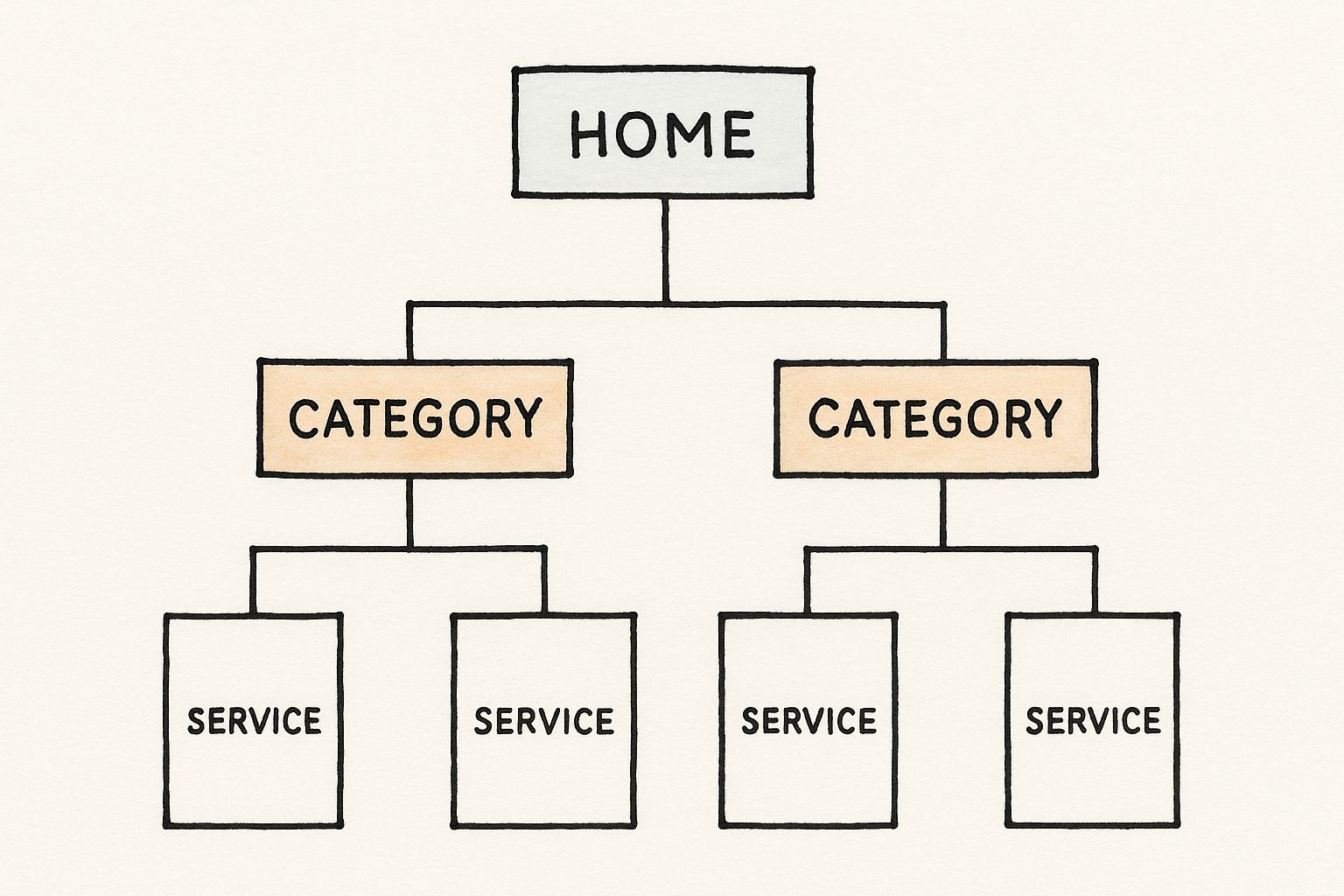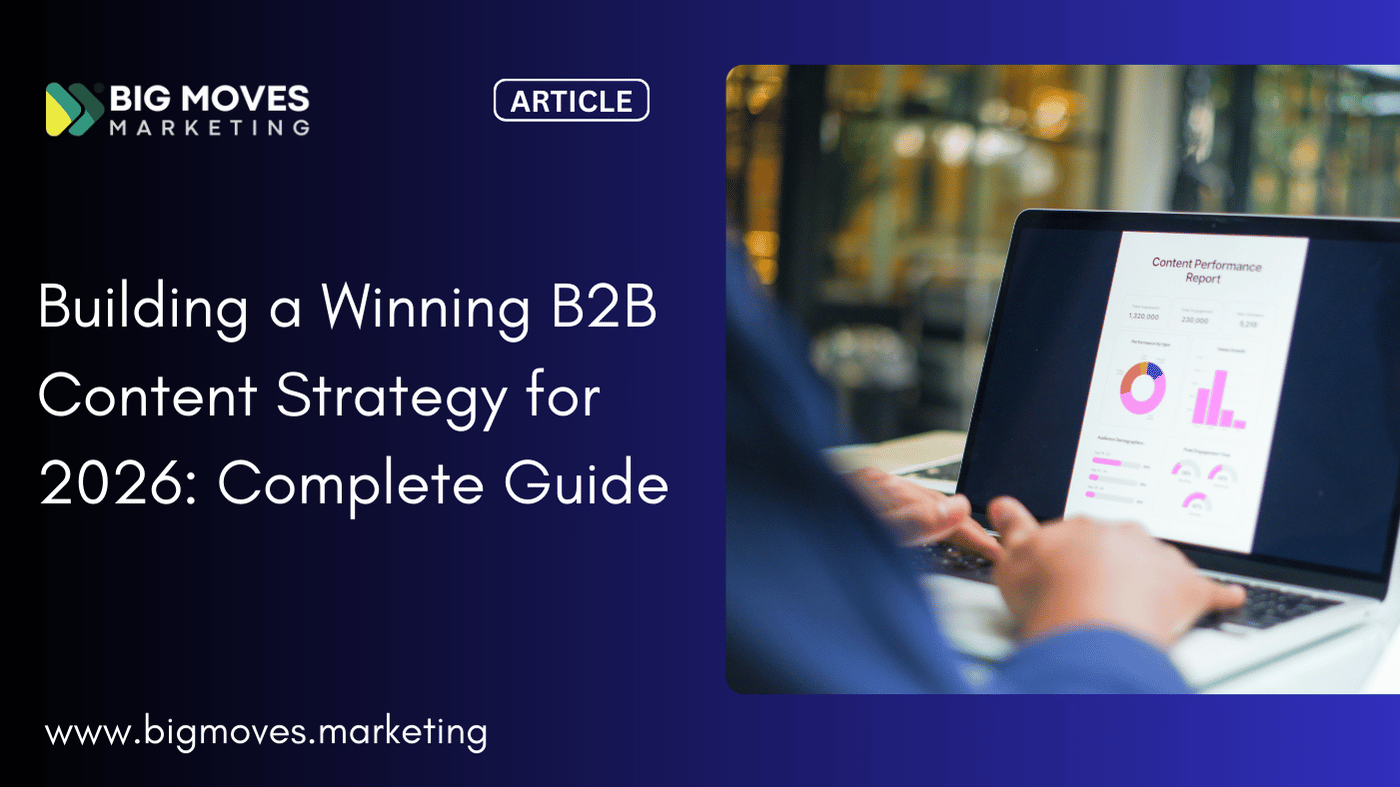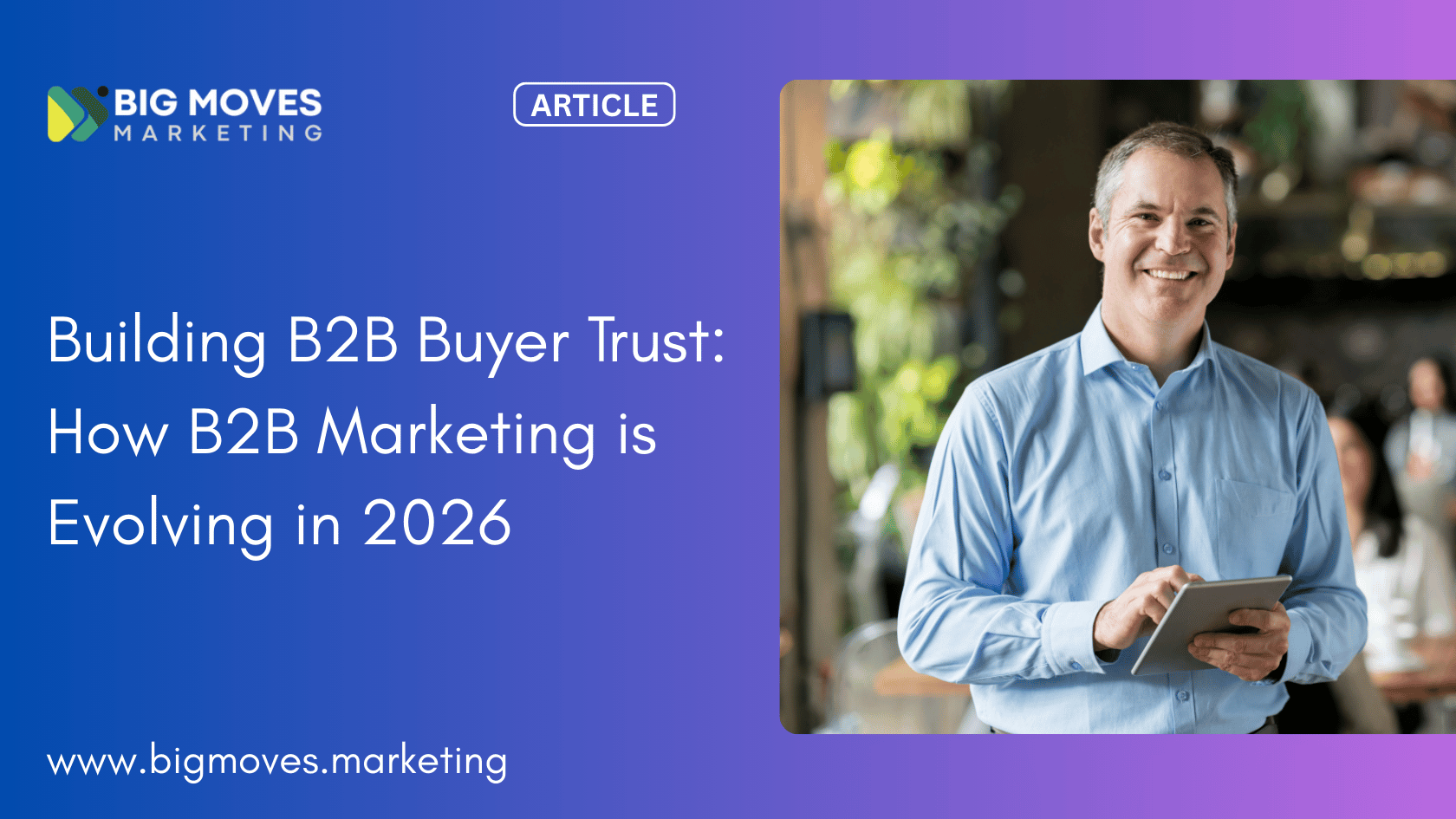SEO for B2B: Proven Strategies to Attract High-Value Clients

Imagine having a direct line to your most valuable future clients, one that’s always on, 24/7. That’s the real power of a smart B2B SEO strategy. It’s not a technical checklist item; it's a core business function that puts you front and center the exact moment decision-makers are hunting for solutions like yours.
Why B2B SEO Is Your Ultimate Growth Catalyst

In the B2B world, a sale rarely starts with a cold call anymore. It begins with a problem, a question, and a search engine. Your future clients are doing their homework—a lot of it—long before they ever signal any intent to buy. This is precisely where SEO for B2B becomes your most powerful asset.
Think of it like building a dedicated highway system that leads straight to your front door. While other marketing channels might create temporary billboards or detours, a solid SEO foundation paves a permanent, high-speed route for prospects who are already looking for your destination. It’s about creating a consistent, predictable flow of high-intent traffic.
The Undeniable Impact of Organic Search
The modern B2B buyer's journey is now overwhelmingly digital. They prefer to research and evaluate on their own terms. The data is clear: organic search drives a massive 44.6% of all B2B revenue, making it the single largest channel. And with 91% of buyers now preferring to make purchases online, your visibility on Google isn't just a nice-to-have; it's essential for survival.
This fundamental shift means that if you’re not showing up in search results, you’re effectively invisible to your most motivated prospects. Your online presence has become your first impression, your hardest-working salesperson, and your most reliable source of leads—all working around the clock.
To really get a feel for this potential, it helps to first understand the core principles of what search engine optimization entails. These fundamentals are the building blocks of any successful B2B growth engine.
Moving Beyond Technicalities to Strategy
It’s critical to stop thinking of SEO as a simple marketing chore and start treating it like a core business strategy. Great SEO for B2B isn't about trying to game Google's algorithms. It's about deeply understanding your ideal client's biggest challenges and consistently providing the clearest, most authoritative answers. For a deeper dive, our guide on building a B2B SEO strategy can help you create this essential framework.
This strategic approach delivers a few key advantages:
- Builds Lasting Authority: When you consistently show up with valuable answers, you establish your brand as a trusted industry leader.
- Generates Compounding Returns: Unlike paid ads that stop when you stop paying, the value of a high-ranking article or guide grows over time, attracting new leads without any additional cost.
- Aligns with Buyer Behavior: It meets modern decision-makers exactly where they are—independently researching solutions on their own terms.
Uncovering High-Value Keywords for the B2B Buyer

Effective B2B SEO really kicks off when you learn to speak your client's language—specifically, the language they use when they're trying to solve a business problem. It's less about chasing huge search volumes and more about becoming a detective, piecing together the clues that point to real purchase intent.
Your mission is to find the exact phrases a decision-maker types into Google when they've moved past simple awareness and are actively looking for solutions. This means a shift in mindset. You're not casting a wide net with generic terms; you're zeroing in on long-tail keywords that signal serious commercial interest. A huge part of this is knowing how to find profitable keywords that actually connect with the specific challenges your B2B audience faces.
The B2B buying journey is rarely a straight line. In fact, Google data shows that the average B2B buyer conducts 12 different searches before they even land on a vendor’s website. This deep research phase is exactly why your keyword strategy needs to be thoughtful and meet buyers at every single step of their journey.
Distinguishing Intent Beyond the Search Box
The real heart of B2B keyword research is getting to the why behind the search. You have to learn to tell the window shoppers from the serious buyers, and that all comes down to user intent.
In the B2B world, these queries generally fall into a few key categories that map directly to the sales cycle.
Let's break them down:
- Informational Keywords: These are top-of-funnel searches. People are in the early research phase, looking for definitions, answers, or educational content. Think "what is data warehousing" or "how to improve team productivity." These might not lead directly to a sale, but they're essential for building trust and brand awareness early on.
- Investigational Keywords: As buyers get smarter, their searches get more specific. They start comparing solutions, looking for best practices, or seeking out tools to get the job done. Keywords like "salesforce vs hubspot," "best project management software for startups," or "cybersecurity compliance checklist" fit squarely in this category.
- Transactional Keywords: This is where the magic happens for SEO for B2B. These keywords signal a clear desire to buy or hire someone. They often include powerful modifiers like "pricing," "demo," "service," or "consultant." A search for "fractional CMO services for SaaS" is infinitely more valuable than a generic search for "marketing tips."
A Framework for Actionable Keyword Discovery
Finding these high-value keywords isn't about luck; it's about a structured process. A solid strategy ensures you’re attracting qualified decision-makers, not just random traffic. Always start with your ideal customer's pain points and work your way backward.
What business problems are keeping them up at night? What solutions are they actively searching for right now?
Think like your customer. A CMO of a growing SaaS company isn't searching for "marketing ideas." They are searching for "how to reduce customer acquisition cost" or "lead generation strategies for enterprise software." The specificity is where you find your opportunity.
Here’s a simple framework to guide your keyword hunt:
- Brainstorm Core Problems: Get your team together and list the top 5-10 major business challenges your product or service absolutely nails.
- Translate Problems into Queries: For each problem, brainstorm how a client would actually type it into Google. Use modifiers like "how to," "software," "platform," "service," and "provider" to flesh out your list.
- Analyze Competitor Keywords: Use your favorite SEO tool to see what terms your successful competitors are ranking for. Don't just copy them. Look for the gaps. Where are they weak? Can you create far better content for a term they're already ranking for?
- Listen to Your Sales Team: Your sales and customer service teams are a goldmine. They're on the front lines, hearing the exact language customers use to describe their needs every single day. Ask them for the most common questions and objections they get—these are pure keyword gold.
By mapping your findings to each stage of the buyer's journey, you ensure your content pipeline is perfectly aligned with your business goals. This methodical approach transforms your website from a simple brochure into a powerful engine for attracting and converting high-value B2B clients.
5. Creating B2B Content That Drives Purchase Decisions
In the B2B world, content does a lot more than just attract eyeballs. It’s about shaping minds and guiding incredibly complex purchase decisions. Think of your content as your best salesperson—the one who works around the clock to educate prospects, build unshakable trust, and patiently walk them toward your solution.
It's the very engine that powers your entire SEO for B2B strategy.
Business buyers are a different breed than consumers. They run on data, they demand proof, and they’re obsessed with de-risking every choice they make. A shallow blog post just won’t do the trick. They’re hungry for depth, expertise, and resources that genuinely help them do their jobs better and justify their decisions to a whole committee.
This is where your content needs to step up. It's time to stop thinking of it as a marketing expense and start treating it like a portfolio of valuable, revenue-generating business assets.
Building Your Content Foundation
The aim here isn't just to answer a question. It's to create content so valuable that it establishes your company as an indispensable authority in your space. This all starts with a smart, strategic approach to how you structure and present your knowledge. You're not just writing articles; you're building a library.
This diagram shows a simplified version of how this works. Broad category pages act as entry points, guiding users toward more specific, in-depth service pages. It creates a logical, intuitive journey for your visitors.

This structure ensures that the deeper a user goes into your site, the more targeted and detailed the content becomes, perfectly matching their evolving needs.
This kind of strategic organization is the backbone of any successful B2B content program. The most effective way to do this is by creating "pillar pages"—massive, comprehensive guides on a core topic—and then supporting them with a "cluster" of more focused articles that all link back to that central pillar. This model not only makes your site easier for users to navigate but also signals "authority" to search engines.
The old model of "SEO blogs"—churning out thin, keyword-stuffed articles—is failing. We have to get back to the core of what works: creating things that others want to read and engage with because they are genuinely helpful. It's not that people don’t read anymore; it's that much of what's being published isn't worth reading.
High-Impact Content Types For B2B
To truly connect with a sharp business audience, you need a mix of content formats. Each one should be designed to serve a different purpose at various stages of their buying journey. A truly effective B2B content marketing strategy for conversions always relies on a diverse set of assets.
Choosing the right format for the job is crucial. The table below breaks down some of the most effective B2B content types and maps them to their strategic purpose, helping you decide what to create and when.
B2B Content Types and Their Strategic Purpose
Ultimately, having a strong mix of these formats allows you to meet buyers wherever they are in their process, equipped with exactly the information they need to take the next step.
Here are some of the heavy hitters that consistently build trust and drive action:
- Comprehensive "How-To" Guides: These are your detailed, step-by-step masterclasses that teach your B2B audience how to solve a complex, specific problem. They're magnets for organic traffic from users with high purchase intent because they position you as a helpful teacher, not just another vendor.
- Data-Rich Whitepapers & Original Research: Nothing signals authority like new, proprietary data. Running your own surveys or analyzing industry trends and publishing the findings in a whitepaper gives you something truly unique. This content is a goldmine for earning high-quality backlinks from other authoritative sites.
- Detailed Case Studies: B2B buyers don't just want promises; they need proof. Case studies are the ultimate form of social proof, telling a compelling story of how you solved a real business problem for a real client—with measurable results. They shift the conversation from "what you do" to "what you've done for others just like me."
- Insightful Comparison Articles: As buyers get closer to a decision, they start actively comparing their options. Creating honest, detailed articles that stack your solution up against alternatives (whether direct competitors or different approaches) helps you control the narrative and builds immense trust through transparency.
The Role Of Content In Empowering Sales
Don't forget, your content's job isn't over once a lead comes in. These high-value assets are also incredibly powerful tools for your sales team.
A well-timed case study or a detailed guide can be the perfect thing to help a sales rep overcome objections, educate stubborn stakeholders, or simply speed up the entire sales cycle.
When you align your content strategy with both your marketing and sales goals, you create a seamless system. Every single piece of content works together to attract, convince, and convert. This is how your SEO for B2B efforts transform into a true growth engine for the whole company, delivering returns for years to come.
Building Digital Authority with Strategic Link Building
In the world of SEO for B2B, a backlink is so much more than a technical signal. Think of it as a digital referral from a respected colleague. When another reputable site links to your content, it’s a powerful vote of confidence, telling both search engines and potential clients that your company is an authority worth listening to.
This whole process, which we call link building, should never feel like you're trying to trick an algorithm. It's really a form of digital public relations—a way to build genuine relationships. The true goal is to earn high-quality endorsements that cement your company's reputation as a market leader. This builds confidence in decision-makers long before they ever think about contacting your sales team.
From Cold Outreach to Real Relationships
Effective B2B link building has moved far beyond sending out cold, generic email blasts. Today, it’s all about creating genuine connections with other players in your industry—journalists, editors, influential content creators, and even other businesses. The most sustainable strategies focus on creating assets so valuable that other people feel compelled to cite them.
This approach requires a real shift in mindset. You're not just asking for a link; you're offering tangible value. In doing so, you build a network of allies who start to see your company as a go-to source for credible, insightful information. This kind of authentic relationship building is a cornerstone of any successful B2B marketing program, creating a foundation of trust that benefits your entire business.
Proven Strategies for Earning High-Quality Backlinks
Building digital authority isn't an accident; it's an intentional process. Instead of chasing a high quantity of low-value links, your focus should be on acquiring a smaller number of links from highly relevant and respected sources. A single link from a major industry publication is worth more than a hundred from irrelevant online directories.
Here are a few proven strategies for earning backlinks that actually move the needle in B2B:
- Create Original Research and Data: Run your own industry surveys or analyze existing data to produce a one-of-a-kind report, something like "The 2024 State of Cybersecurity in Fintech." This proprietary data becomes a powerful magnet that journalists and bloggers will eagerly cite and link back to as their source.
- Contribute Insightful Guest Articles: Pinpoint the reputable industry blogs and publications your ideal customers are actually reading. Pitch and write genuinely helpful articles that showcase your expertise. This not only builds your brand's authority but also secures a valuable backlink from a trusted source in your space.
- Develop Link-Worthy "Power Pages": Build the ultimate guide, a free tool, or a comprehensive resource hub that becomes the definitive source on a specific topic. A free "SaaS MRR Calculator" or an in-depth guide to "Implementing ISO 27001 Compliance" is exactly the type of high-utility asset that other sites will naturally link to as a helpful resource for their own audience.
The old model was about "building" links. The new, far more effective model is about earning them. Stop asking, "How can I get a link?" and start asking, "How can I create something so valuable that people can't help but link to it?"
Identifying High-Value Link Opportunities
Not all links carry the same weight. Your outreach efforts have to be strategic and laser-focused. The key is to find websites that are not only authoritative but also highly relevant to your business and what your clients care about. A methodical approach ensures your time and effort are spent on opportunities that will actually make a difference.
Here’s a simple process for finding the right targets:
- Analyze Your Competitors’ Backlinks: Use an SEO tool to see which high-authority websites are already linking to your top competitors. If a site is linking to them, they've shown they're interested in your topic, making them a perfect target for outreach.
- Look for Non-Competing "Shoulder" Niches: Identify businesses that serve the same audience as you but aren't direct competitors. For example, a project management software company could collaborate with a firm that provides team productivity training.
- Find Resource and "Best Of" Lists: Search for phrases like "best B2B sales tools" or "top resources for marketing managers." Reach out to the authors of these listicles and make a compelling, value-driven case for why your content or tool deserves to be included.
By focusing on these quality-driven tactics, you transform link building from a tedious chore into a core strategic function. It’s how you build lasting digital authority and fuel your SEO for B2B success.
Technical SEO for a Professional User Experience
Think of technical SEO as the backstage of a world-class theater. When it works perfectly, the audience never even notices it’s there. They just enjoy a flawless performance. The same is true for your website—especially when your audience consists of B2B buyers.
A seamless site experience isn't just a nice-to-have; it's a powerful signal of your company’s competence. When a decision-maker with buying power lands on your site, they expect a fast, intuitive, and secure environment. Any friction, like a page that takes forever to load or a confusing layout, immediately plants a seed of doubt.
If your website is clunky, they'll wonder if your product is too. A technically sound website shows you care about the details, a quality every B2B client looks for in a partner.
The Non-Negotiables for a B2B Website
While technical SEO is a deep field, a few areas have an outsized impact on the B2B user experience. These aren't just best practices; they're the table stakes for earning credibility with a professional audience.
Get these pillars right, and you're building a foundation of trust.
- Site Speed and Performance: B2B decision-makers are short on time. A slow website communicates inefficiency. In fact, a one-second delay in page load time can slash conversions by up to 7%. Your goal is to deliver information almost instantly, showing you respect their packed schedule.
- Mobile Functionality: Executives and procurement managers are constantly on the move, researching solutions on their phones between meetings. Your site has to deliver a flawless mobile experience, complete with easy-to-read text and navigation that works for thumbs. A clunky mobile site is like a locked door for a huge chunk of your audience.
- Logical Site Architecture: Your website’s structure should be as intuitive as a well-organized filing cabinet. A clear hierarchy of pages, supported by logical navigation and breadcrumbs, lets users find exactly what they need—whether it’s a case study, your pricing page, or a technical whitepaper—without any guesswork.
Using Schema to Speak Google’s Language
One of the most potent technical elements for B2B is schema markup. Think of it as adding a set of digital "labels" to your website's code that tells search engines exactly what your content is about. It goes beyond keywords to provide specific, unambiguous context.
For instance, you can use schema to explicitly identify:
- Your business as an "Organization"
- Your offerings as a "Service" or "Product"
- Your articles as a "TechArticle"
- Your webinars as an "Event"
- Your customer testimonials as a "Review"
This structured data helps search engines understand your business on a much deeper level. In return, they can feature your information more compellingly in search results, like adding review stars to your listing or displaying detailed service descriptions. It’s like giving Google a crystal-clear brief on your company.
To dig in and find specific areas for improvement, a comprehensive WordPress website audit checklist can be an indispensable guide for systematically reviewing these technical elements.
By mastering the technical fundamentals, you build a website that exudes professionalism and trust. You ensure that when a high-value prospect shows up, your site works to close the deal, not kill it.
Measuring SEO Performance with Business-Focused KPIs
The ultimate test of any B2B SEO strategy isn't rankings or traffic. It’s business growth. Full stop.
Seeing your site climb the search results is a great feeling, but that excitement dies fast in the boardroom. Executives want to know how that visibility translates into revenue. This is where you have to stop talking about vanity metrics and start tracking the Key Performance Indicators (KPIs) that actually matter to the bottom line.
Your real job is to tell a compelling story about return on investment (ROI). It's about proving that your SEO efforts aren't just an expense, but a powerful growth engine for the whole company. Once you can connect your work directly to business outcomes, you'll find it much easier to secure bigger budgets and a more influential seat at the table.
Shifting from Vanity Metrics to Business Impact
Too many marketing teams get stuck reporting on metrics like keyword rankings, organic sessions, and bounce rate. While these can be useful diagnostic tools, they don't answer the C-suite's most important question: "How is this making us money?"
Think of it this way: traffic is just people walking into your store. It’s a promising first step, but it’s not a sale. The metrics that truly matter are the ones that show those visitors are taking actions that lead to revenue.
The most impactful SEO programs are those that can draw a straight line from a blog post to a closed deal. This requires a shift in focus from "How many people saw our content?" to "How many of the right people took a meaningful action because of our content?"
For a B2B company, these meaningful actions are crystal clear and incredibly valuable. Your reporting should revolve around:
- Marketing Qualified Leads (MQLs): The number of high-quality leads coming from organic search, like people who download a detailed whitepaper or fill out a "contact sales" form.
- Demo Requests & Trial Sign-ups: These are high-intent signals that a prospect is moving from just looking around to seriously evaluating your solution. Tracking these from organic channels is non-negotiable.
- SEO-Attributed Revenue: This is the ultimate goal. By connecting your website analytics with your CRM, you can pinpoint which customers first found you through organic search and calculate the actual revenue they generate.
Connecting SEO to Revenue
Thankfully, figuring out how to track these conversions isn't rocket science. Tools like Google Analytics let you set up conversion goals for critical actions like form submissions or demo requests. By tying these goals to your organic traffic, you can see exactly which pieces of content are driving valuable business outcomes. Our guide on how to measure marketing effectiveness takes a much deeper dive into setting up these frameworks.
This performance-driven mindset is quickly becoming the industry standard. As of 2025, a staggering 80% of B2B executives now evaluate SEO spending based on projected ROI instead of fixed costs. This shift makes sense when you consider that 55% of enterprise B2B companies are now spending over $20,000 per month on SEO, as detailed in recent B2B SEO budgeting data from firstpagesage.com.
When you can prove your B2B SEO strategy is a profit center, you don't just justify the investment—you position yourself as a key driver of growth.
Got Questions About B2B SEO? Let's Clear Things Up.
Diving into B2B SEO can feel like a massive undertaking, and it's normal to have questions before you commit. It’s an investment, after all—one that pays off big time when you get it right. Let's tackle some of the most common questions from founders and marketing leaders.
How Long Until We Actually See Results From B2B SEO?
This is a common question. B2B SEO isn't a magic wand for overnight leads. It’s a long-term play. Because B2B sales cycles are lengthy and building real authority doesn't happen in a week, you should realistically plan to see significant results—think qualified leads and a measurable ROI—within 6 to 12 months.
You'll see early wins sooner, of course. Things like bumps in organic traffic and seeing your company name pop up for more keywords are great signs that things are moving in the right direction. But the real goal, sustainable business growth, comes from consistent, patient effort.
What's More Important: Content or Backlinks?
This is the classic chicken-or-the-egg question of SEO. The truth? They're two sides of the same coin. You absolutely need both to build a successful SEO for B2B program. One without the other just doesn't work.
Think of it this way: Your content is the engine, but backlinks are the high-octane fuel that makes it go. You can't win without amazing content that solves a real business problem for your B2B buyer. But without backlinks from other trusted sites to vouch for you, even the world's best content will sit in the dark, invisible to Google and your audience.
A winning strategy doesn't pit them against each other; it weaves them together. They don't compete for importance—they amplify each other's impact.
Can My Small B2B Company Really Compete With Huge Enterprises?
Absolutely. In fact, being smaller can be your secret weapon. The trick is to be smarter and more focused, not just louder. Forget trying to out-muscle them for broad, high-volume keywords. That’s a losing battle.
Instead, concentrate on specific, long-tail phrases that target the niche business problems you solve better than anyone else. Your specialized expertise is your biggest advantage. Go deep. Aim to create the single best, most helpful resource on the internet for that very specific challenge. When you become the undisputed go-to expert for a particular niche, you build a powerful, defensible position that big, slow-moving enterprises can't easily threaten.
For companies looking to really sharpen this advantage, partnering with a specialized B2B marketing consultant can give you the focused strategy you need to outmaneuver the giants. Your agility is what allows you to own the corners of the market that they completely overlook.
At Big Moves Marketing, we live and breathe this stuff. We specialize in building these strategic advantages for B2B SaaS and tech companies. We blend deep industry experience with agile execution to build growth campaigns that you can actually measure.
Ready to build a powerful growth engine for your business? Learn how we can help you get there at https://bigmoves.marketing.
%20png%20copy.png)






%20-%20white.svg)
